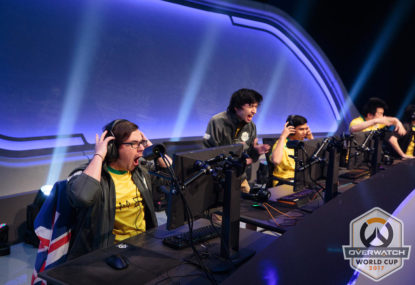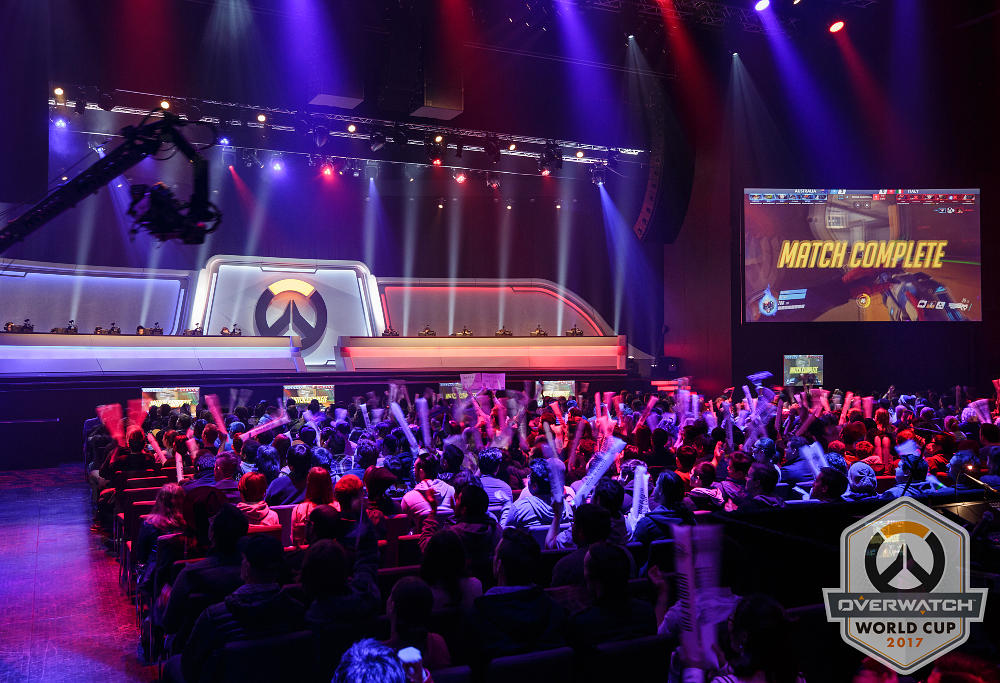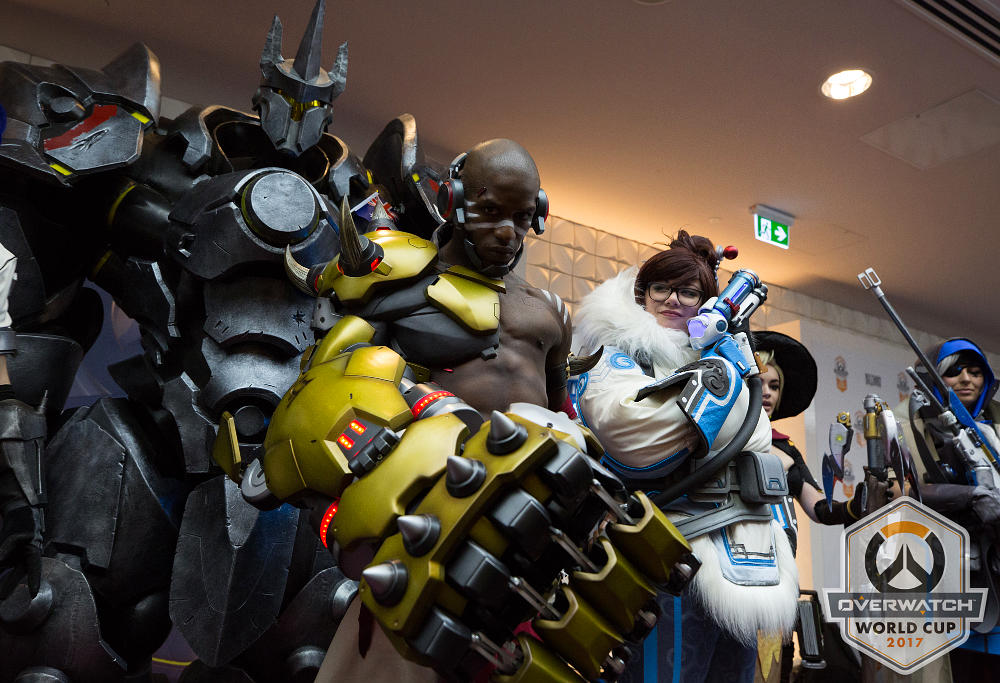2022 Trivia: The Roar's jam-packed Christmas Day sports quiz!
The jam-packed month-by-month quiz full of 2022 sports trivia!

Overwatch is going from strength to strength.
This past weekend saw the Overwatch World Cup descend upon Australia in the form of the Sydney group stage.
Eight teams from around the world competed for the top two spots that would take them to Blizzcon, and by the end of it, Teams Sweden and Australia had scored them.
In the case of Australia, it took a full best of five to get there. Team Japan, a rising star squad over the weekend, took them to the tiebreaker and kept Australian viewers on the edge of their seats as the overtime reset over and over.
In the end though, the Australian boys Blank Esports won their ticket to the main event, and from social media, a whole host of new fans.
During the weekend, I had a chance to sit down with Nate Nanzer, who oversees the breadth of Overwatch esports at Blizzard. With the World Cup looming and the first showing of the Overwatch League on the horizon, I got the scoop on how it’s being built and the philosophy behind esports at Blizzard.
The Roar: Tell me a little about your position at Blizzard and what encompasses Overwatch esports today.
Nate: I’m the commissioner of the Overwatch League – it’s pretty cool that in 2017 you can work at a game company and have the title commissioner. I look after all Overwatch Esports, so the OWL – our premiere, global city based league, World Cup – our national team competition, contenders – our global development league and open division – a global league open to all players. Then there’s collegiate stuff and things we do in specific markets.
Overwatch was a really awesome opportunity to sort of imagine what esports could be from the beginning of the lifecycle of a game. The game’s brand new, only been out for just over a year, and it’s Blizzard’s first new IP in 17 years. Amazingly, Overwatch is also our fastest game ever to reach 30 million players.
It’s a game we designed from the ground up to be a great competitive experience and we saw it as an opportunity to build a sport around it, to be able to celebrate our players and our fans, and also really look to build a real business around that. We looked at structures and formats from traditional sports and marry that with our expertise of 26 years of making esports content – we think that’s a powerful combination.
Overwatch is still young as an esport, as you’ve said, but how do you feel about the current day state of the game?
Overwatch is super healthy right now. The game continues to grow every quarter, we’ve set record engagement literally every quarter since launch, and we’re seeing some amazing play at the pro level. World Cup this year was really important for us to have the best players in the world, where last year’s was a little more of an exhibition. We really wanted it to be the highest level of competition and the matches this weekend reflect that.

You’re kind of in a unique position where you’re able to build your game as an esport from day one, as opposed to others that pivot to esports as they mature. How did you go about factoring that into development?
We didn’t really set out to make Overwatch an esport, but we set out to make it a great competitive experience – but it was very clear early on that it was going to be an esport. From internal testing early on we were playing tournaments in the office when there was only four playable heroes.
At Blizzard, we think when you have a competitive PVP game, esports is a cost of entry – you have to support it. But we also thought of it as an opportunity to really build something from the beginning and there’s a huge audience out there that wants to engage in competition. So we’re trying to put the pieces in place to be able to have players at all levels of play able to participate, and then to have a clear path to pro where everyone who plays the game knows the things they need to do to be a pro and have a great aspirational league at the top of that for the best players in the world.
Looking forward, what are your goals for development of Overwatch esports and the League?
We’re taking a very long-term approach. We’re not building the Overwatch League for the next year or the year after – this isn’t lip service, we’re really thinking about building a ‘forever’ league. We don’t consider a game a franchise unless we’re going to invest in it perpetually, and we’ve proven that over all our games – I mean we just patched Diablo 2 not even that long ago.
We want the owners we announced last week and more owners to come in the near future to partner with us for the long term and build this with us. Building a sports league takes time, you gotta build the audience, and we think events like the World Cup are a great opportunity to bring more casual gamers and fans in who maybe don’t know a lot about esports or teams.
Everybody knows what ‘team Australia’ is, so it’s a little bit easier to get excited about it, and from there the hope is they get excited about it and want to learn more from there.
How is your team rolling the sport out in smaller and less developed esport regions, for example, Australia and New Zealand?
For Australia and New Zealand we have Overwatch Open Division, and we hope in the near future to have something similar to Contenders there. There’s a lot of great players down here and some great teams that are looking to get involved in Overwatch. No news on that yet, but it’s something we’re definitely looking at – could we get a contenders/development league going here?
Both from marketing and real-life stories, it seems the idea of building your own path from grassroots to pro is key to Overwatch’s development. What drives this idea?
If you look at the history of esports, even as a longtime fan, it was never quite clear how you become an esport professional. Like, it’s clear how you become a basketball or a football player – there are very established things that you do on that path.
It was important to me that we set up an ecosystem so that every kid and player who plays Overwatch knows the steps they need to take if they want to be a pro player. That was the guiding principle for our development of the ecosystem.
Was there any sport in particular you looked at to help shape your vision for the Overwatch League?
In the process of building the Overwatch League we looked at the NFL, the NBA, obviously Major League Baseball, but we also looked at the Premier League and AFL – almost every league on the planet cause they all do it a little differently.
We looked and said, “What are the things that we like that these leagues do?” And we had the opportunity to kind of pick and borrow what we wanted – since there isn’t really a set playbook on how to do this – and then marry that with the best practices from esports to pull together a league which we think is the best fit.
Do you think it’s this system and influence of traditional sports that’s drawing more traditional sports owners into the Overwatch League? Do the similarities make it more tangible than other esports?
They definitely recognise it. I think for us, what traditional sports owners bring to the table, besides the obvious great local capability, is that we’re partnering with people that have a proven history in building, growing and fostering fandom. Esports owners are excellent at that too, and a lot of the time esports owners have a more challenging time doing that because they don’t have a city to anchor to. But that’s really the core of what we’re looking for with team owners – owners who are great at building fanbases and are going to celebrate players in the way we think they deserve to be.

How do you go about making sure that a game as vibrant and action heavy as Overwatch stays engaging and understandable? Is there anything in the pipeline to keep enhancing the spectator experience?
There’s still a lot of work to be done with the spectator experience, we have a tonne of features we’re working on and we have a whole production team on this – you may have seen this weekend we’re doing picture-in-picture stuff. We’re going to continue to improve the way we produce shows and the matches, but there’s definitely a bunch of features and things we want to do in the game to make it watchable and a little more digestible for new players to follow.
Lastly, what effect do you think Doomfist will have on the game and competitive play when he hits live later this week?
I think everyone’s waiting to see what Doomfist is going to do to the meta, and what that impact will be. It’s always interesting when we release a new hero, when we released Sombra everyone was like, “Oh Sombra, she’s no good!” but this weekend I’m seeing a lot of Sombra, and she’s pretty good.
It’s going to be interesting to see how that plays out this time around, and we’ll see how things develop after he’s released, and do any balance from there that’s needed.